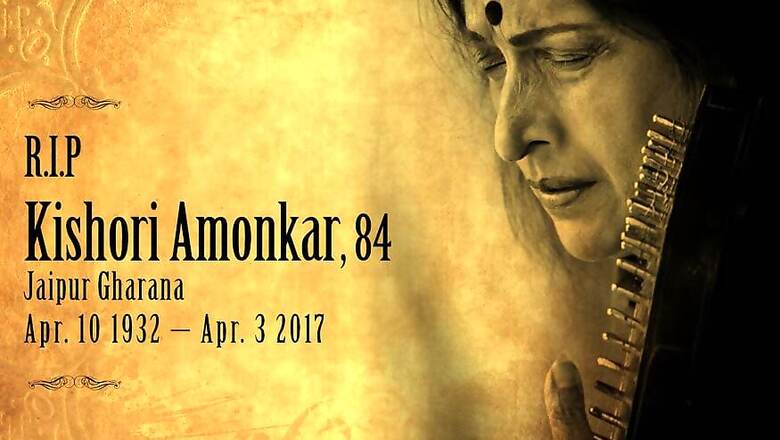
views
As I sit down to write a tribute to the Legendary Vidushi Kishori Amonkar, I look up from my window to see an overcast sky. As it starts raining, it seems the nature is mourning the death of GyanSaraswati, the Goddess of Music, the great Kishori Amonkar.
The demise of the Padmavibhushan awardee is a great loss to the country and a greater loss to the Indian Classical Music Tradition.
I remember seeing her surrounded by her students carefully tuning her tanpuras in her greenroom at the beginning of a concert in Chembur, Mumbai in 2003. She practiced for another hour and then came on stage to sing a 2 hour long slow vilambit alaap in Raag Shuddh Kalyan. A careful vistaar of the shuddh swars of the Raaganga in a reverberating scintillating voice, manuvering the nuances of the Jaipur-Atrauli Gharana, created an atmosphere of silent contemplation in the audience. She was known for building up the tempo of Bada Khayal with attention to detail in preserving the mood of the raga, raagdhari (Raga Development), tans and simple, effortless, beautiful compositions. She displayed her expertise of the gayaki, a legacy that was handed to her by her guru, her mother Mogubai Kuridikar of the Alladiya Khan Jaipur Atrauli Gharana. Her musical training included honing a trained voice that traversed 3 octaves and the ability to discern Shrutis (Microtones).
Kishori ji’s Meera and Kabir Bhajans are a delight to listen to. Her ability to present pure shuddha sampoorna ragas in the tradition and at the same time sing bhajans showed her mastery in both pure classical music and light classical music. She had performed widely and fortunately has left us with a wide range of recorded music to savour for years to come.
A woman of great strength, with the courage to stand alone and defend herself in a musical world that was predominantly steered by men, she carved a permanent niche for herself and was unshakeable! She was influenced by and suffered the ill-treatment of her mother as a musician who did not get the accolades that she deserved. Kishori Amonkar was often herself coerced and cajoled into to compromising the tradition to sing lighter forms for the pleasure of her audience although she stood firm, refusing to change the essential basic tenets of her gharana and Indian Classical Music. This is the quality that made her achieve her excellence.
But unfortunately, the musical world did not understand her depth of sadhana and knowledge and her stringent preferences that she adopted of solitude, choosing her concerts, choosing a few ragas (such as Bhoopali, Shuddh Kalyan and Yaman for intense riyaz) were necessary for her to preserve the tradition. She was often disrespected and not given the remuneration for her concerts, instead she created a trend of advance payment of the artists before the concert.
She chose to perform less, to teach in the guru-shishya parampara and carry the tradition forward and also write a book instead. There are many students she has taught and she is exemplary among many young artists all over country who will look up to her for years to come as a role model, a brilliant musician and a personality beyond par.



















Comments
0 comment